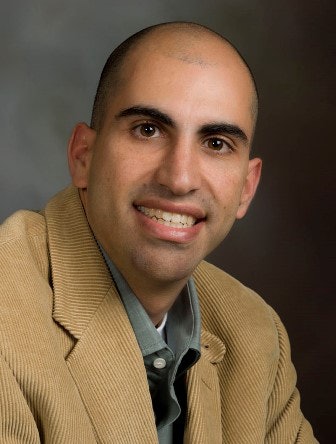 Virginia Tech English professor Steven Salaita is at the center of controversy after writing that blind military support has become a barrier to questioning American foreign policy.
Virginia Tech English professor Steven Salaita is at the center of controversy after writing that blind military support has become a barrier to questioning American foreign policy.BLACKSBURG, Va. — A Virginia Tech professor’s commentary on an online news website about the “Support the Troops” sentiment has sparked a backlash against him and the school.
In his piece Sunday on Salon.com, tenured English professor Steven Salaita argued against blind military support and said it becomes a barrier to questioning American foreign policy. He tells the story of a recent trip to a convenience store and how the clerk was shocked when he declined to donate spare change to “support the troops.”
“In recent years, I’ve grown fatigued of appeals on behalf of the troops, which intensify in proportion to the belligerence or potential unpopularity of the imperial adventure du jour,” Salaita wrote.
“Such troop worship is trite and tiresome, but that’s not its primary danger,” Salaita wrote.
Salaita criticized corporate influence on and profit from war and argued that soldiers benefit little from it.
“Numerous veterans have returned home to inadequate medical coverage, psychological afflictions, unemployment and increased risk of cancer. The free market and corporate magnanimity are supposed to address these matters, but neither has ever been a viable substitute for the dynamic practices of communal policymaking,” Salaita wrote.
Reaction grew from outrage on social media into calls for Salaita’s firing, his deportation and death, and also into criticism of Virginia Tech.
The school told The Roanoke Times it supports Salaita’s right to make the comments, although it doesn’t necessarily agree with them.
University spokesman Larry Hincker said numerous calls and emails had been directed to President Charles Steger and other university offices. Campus police are aware of the threats and “have investigated responses that have come in,” Hincker said.
“I can’t speak to the severity of them,” Hincker said. “We take everything seriously.”
In an interview with the newspaper, Salaita said he wasn’t concerned about the threats because Tech police do a “fantastic job” keeping the campus safe. He said he understands the response because it’s expected “anytime somebody discusses patriotism.”
Salaita has published books on Middle East policies and American-Arab relations. The son of immigrants from Nicaragua and Jordan, Salaita was raised in Bluefield, W.Va., which makes him laugh when critics say he should be deported.
“Well, I come from Bluefield, so if I follow their advice and go back to where I came from I’ll merely be an hour from where I am now,” he said. “As to the suggestion that I shouldn’t teach at an American university, my job is to write critically and teach critical thinking. Why should I be fired for doing my job?”
It isn’t patriotism that is bad, Salaita argues, it’s what he refers to as “unthinking” patriotism.
“Accepting narratives without considering their merits is bad and, unfortunately, American patriotism today often asks us not to use our democratic rights to question policy or to criticize those who profiteer from war,” he said.
While the university stands behind Salaita, Hincker, himself a Vietnam War-era Navy veteran, called accusations that the university is anti-military “extremely hurtful.” He pointed to its 1,000-strong Corps of Cadets, efforts to hire veterans and expanding support for student vets.
“He has a right to his opinions just as others have a right to disagree,” Hincker said.
Upholding academic freedom can be a difficult and even embarrassing thing for universities, said Greg Scholtz of the American Association of University Professors. “But we find that the most reputable institutions give the most latitude.”















